Sustainability in fashion extends beyond merely reusing leftover fabrics and opting for cellulosic fibres. It encompasses reviving ancient, handcrafted techniques, avoiding digital prints that rely on harmful chemicals, embracing sustainable weaving practices, and focusing on capsule collections rather than mass production.
As the fashion industry moves towards greater sustainability, ethical practices, and innovative eco-friendliness, India is leading the way with a remarkable array of Sustainable and homegrown brands dedicated to these principles. These brands are not only redefining fashion but also honouring India’s rich textile heritage through traditional handloom techniques and creative upcycling methods.
Fabindia
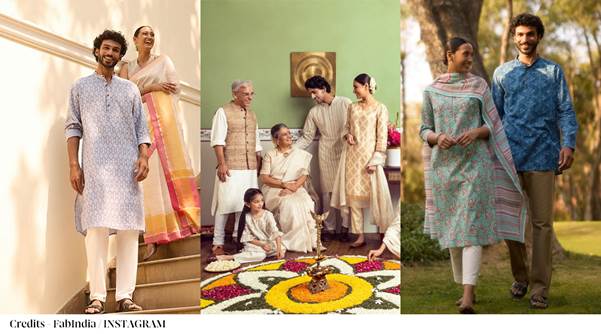
Fabindia is the largest private platform in India for products created using traditional techniques, skills, and handcrafted methods.
The company connects thousands of rural artisans with modern urban markets, fostering sustainable employment in rural areas and helping to preserve India’s traditional handicrafts. It offers a range of products that are natural, organic cotton based, craft-oriented, modern, and affordable.
No Nasties
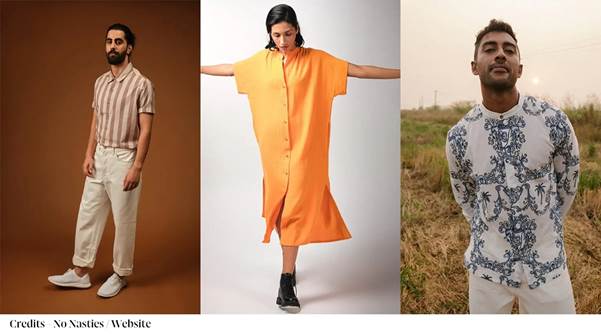
Founded by Apurva Kothari in 2011 to live a more purpose-driven life, No Nasties is committed to minimising its environmental impact through sustainable practices. The brand exclusively uses 100 per cent organic cotton and relies on a fully local supply chain, which helps conserve water, reduce energy consumption, and significantly lower CO2 emissions.
To further enhance its sustainability efforts, No Nasties calculates the carbon footprint of each product and invests in carbon offset projects focused on solar power, wind energy, and reforestation, offsetting three times the footprint of their products. Additionally, for every item purchased, No Nasties plants three trees.
This approach emphasises their dedication to creating a positive impact on the planet, encapsulated in their formula: 300% Offset 3X Trees = Planet Positive.
Doodlage
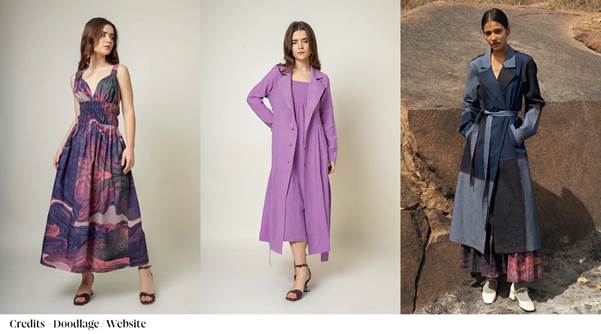
Doodlage is a sustainable fashion brand co-founded by Kriti Tula and Paras Arora, focused on combating waste in the fashion industry. Inspired by the upcycling traditions of their childhoods, they create limited-edition collections from factory waste and recycle post-consumer materials into new fabrics. Their garments are designed for longevity, and they repurpose any waste into accessories and packaging, all produced ethically and without plastic. Doodlage represents a commitment to sustainable practices in fashion, addressing the environmental costs of cheap production.
Okhai
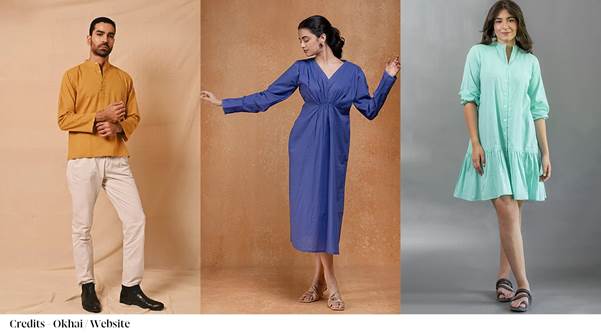
Okhai is committed to creating responsible, handcrafted products using traditional techniques that reflect the artisans’ efforts. The brand emphasises ethical, collaborative, and sustainable practices while empowering rural artisans with skills and confidence. Drawing inspiration from architectural monuments to abstract forms as an artistic expression, Okhai’s collections highlight unique craft and embroidery.
Their vision ensures that artisans have sufficient work, promoting forgotten art forms and enhancing visibility for both the craft and its creators.
The Summer House
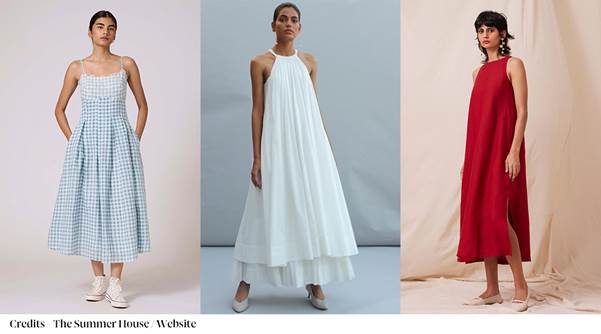
Shivangini Parihar and Rekha Datla founded The Summer House in 2015, driven by a passion for supporting rural artisans and preserving traditional craft techniques and textiles. They collaborate directly with artisans and partner with vetted local NGOs to help vulnerable craft communities transition away from exploitative practices.
Committed to quality and sustainability, The Summer House prioritises responsibly made fabrics, including handwoven, organic options, as well as modern materials like ECONYL regenerated nylon and ethical Tencel. They continually seek innovative ways to maintain the highest ethical and environmental standards in their work.
Suta
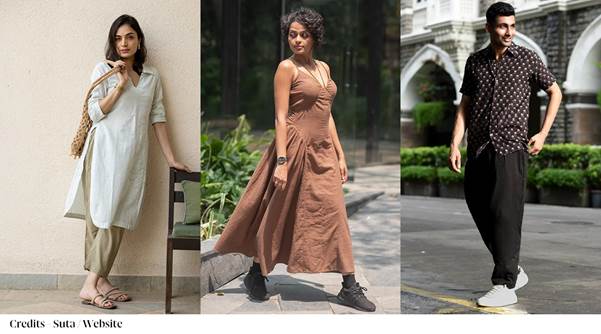
Suta, founded by Sujata and Taniya in 2016, is a vibrant design house that beautifully marries tradition with contemporary fashion. Inspired by the meaning of its name — “thread”—Suta celebrates the rich tapestry of Indian art and culture, a passion that has thrived even after years in the corporate world. The brand’s exquisite collections feature elegant and bold designs crafted from beloved fabrics, showcasing the intricate skills of artisans across India who utilise ancestral weaving techniques.
Each piece from Suta is not just clothing; it is a tribute to the craftsmanship and the countless souls who have contributed to its creation. With a commitment to preserving artistry, Suta aims to keep the spirit of traditional craft alive while infusing it with modern flair, ensuring that every garment resonates with joy and significance.
Corenature
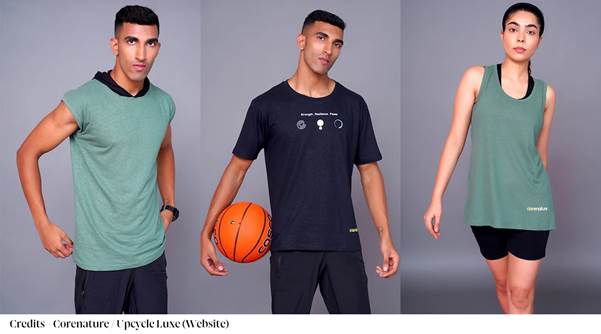
CoreNature is an Indian athleisure brand founded by Mayank Jain, dedicated to promoting sustainability and eco-friendly practices in fashion and lifestyle products. The brand offers a range of stylish and functional athleisure wear made from natural and sustainable materials, including hemp and organic cotton. CoreNature emphasises ethical production processes, supporting local artisans while prioritising environmental responsibility and transparency.
With a focus on minimalism and timeless design, the brand aims to inspire conscious consumerism and foster a harmonious relationship between modern living and nature. Through its commitment to using natural dyes and biodegradable materials, it reflects a deep dedication to sustainability and the preservation of our planet.
B Label
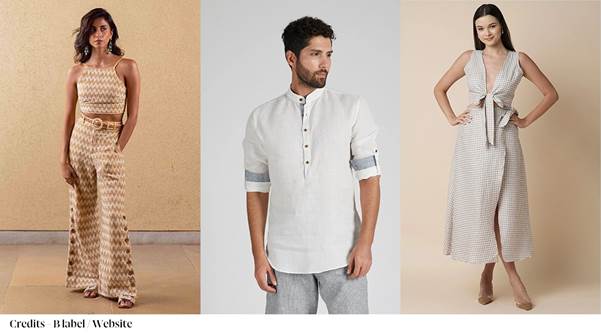
The Bombay Hemp Company (BOHECO), established in 2013, was the first guardian of B Label, pioneering the hemp ecosystem in India and working to transform the agricultural landscape. B Label began as BOHECO’s first consumer-facing initiative with a classic white shirt. Today, BOHECO has shifted its focus to Himalayan Hemp Nutrition and Cannabis Ayurvedic Remedies.
B Label is now reimagined under the creative leadership of Alisha Sachdev, one of the brand’s original team members. Their greatest ally on this journey is hemp—a category of sustainable fashion and lifestyle products that they aspire to lead in India and around the world. They aim to establish a source-to-consumer ecosystem that prioritises responsibility, transparency, and ethics while minimising social and environmental impacts.
Tilla

Tilla, a design studio based in Ahmedabad, India, was founded in 2011 by clothing designer Aratrik Dev Varman. The brand celebrates handmade Indian textiles and craftsmanship, characterised by a practical and elegant aesthetic that seamlessly adapts to diverse global contexts.
Tilla emphasises mindful design and slow production, prioritising minimal waste as a core principle. In addition to clothing sold at leading design stores in India and internationally, the brand has expanded its offerings to include wallpaper, interior textiles, textile art/installations, and a cafe, enriching its portfolio.
Charkha Tales
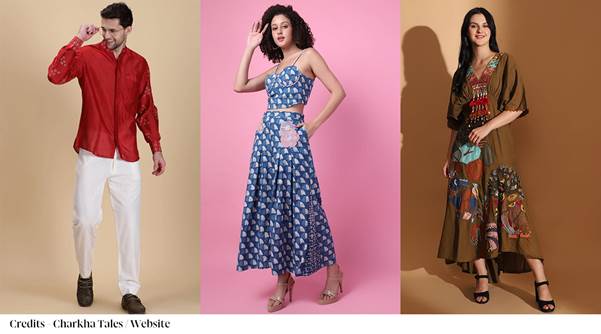
Roopika Rastogi left her successful legal career to preserve India’s heritage of Khadi after discovering its rich legacy during research. She founded Charkha Tales on October 2, 2016, inspired by Gandhi’s revolution through khadi. The brand sources, stitches, and distributes khadi products globally while supporting weavers from Zaidpur and Hardoi in Uttar Pradesh by providing them with necessary resources for sustainable livelihoods.
In addition to khadi, Charkha Tales collaborates with local crafts like chikan embroidery and tie-dye. With a dedicated team, the brand aims to raise awareness about khadi and expand its operations, embodying the spirit of ‘Make in India’.
Khamir
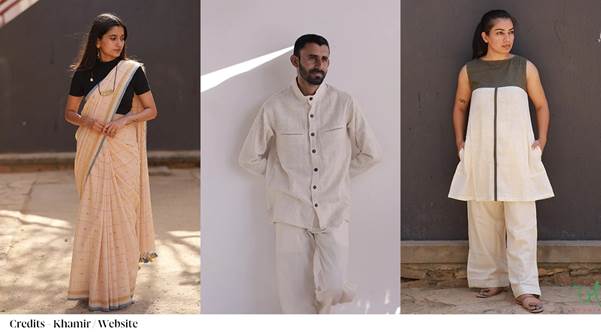
Khamir is dedicated to strengthening and promoting the rich artisanal traditions of the Kachchh district. The name represents Kachchh Heritage, Art, Music, Information, and Resources, with “Khamir” meaning “intrinsic pride” in Kachchhi and “to ferment” in Hindi, reflecting the organisation’s dynamic activities and ideas. Established in 2005 through a partnership between Kachchh Nav Nirman Abhiyan and the Nehru Foundation for Development, Khamir focuses on promoting traditional handicrafts and preserving local culture and environments.
The organisation aims to create an empowering space for collaboration among various stakeholders while shifting consumer perceptions and elevating the cultural value of crafts. Their vision is a vibrant, sustainable Indian craft sector where artisans are highly valued worldwide.
The Terra Tribe

The Terra Tribe, founded by Gaurav Khanna, creates contemporary clothing for those mindful of their environmental impact. Inspired by cultural elements from indigenous African tribes and traditional mud houses, the collection embodies a nomadic spirit and explores unfamiliar cultures. It blends masculine and feminine design elements, incorporating archives from previous collections to ensure timeless versatility. Sustainability and ethical practices are at the heart of the brand, utilising locally manufactured Tencel, handwoven hemp, linen, and organic cotton—some of the most sustainable fabrics available. Garments are dyed with eco-friendly pigments, and recycled metal trims are prioritised wherever possible. Committed to transparency, quality, and a circular ecosystem, The Terra Tribe embraces slow fashion in every aspect of its work.
Sui
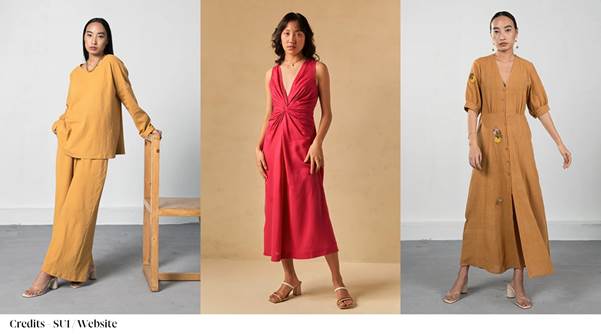
SUI, meaning ‘needle’ in Hindi, is a conscious fashion label based in India and Singapore, founded by Mahima Gujral Wadhwa. The brand symbolises connection, much like a needle links thread to fabric, aiming to intertwine nature with fashion. SUI crafts clothing with a “green heart”, which respects both nature and the artisans who create the garments.
The label focuses on raising awareness about versatile, minimal-impact fashion that treats its makers as family, emphasising that conscious fashion can be beautiful and impactful. Each collection is designed to promote change and features pieces that tell a story, reflecting the inspiration of their makers and the journey behind them. SUI encourages savouring the journey and appreciating the small moments that shape our world.
Jodi
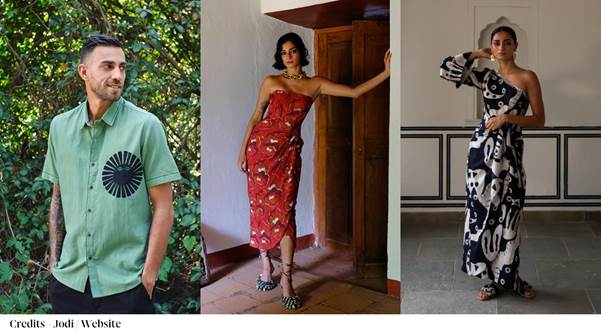
Jodi is an India-based design studio and marketplace founded in 2014 by longtime friends Gauri Verma and Karuna Laungani. As a high-street, slow fashion brand, Jodi draws inspiration from their shared love for craft, culture, fashion, and travel. The brand’s manifesto focuses on offering joyful, fashion-forward designs for both home and wardrobe, utilising natural Indian textiles and championing artisanal techniques such as hand block printing, bandhini dyeing, and hand embroidery.
Jodi’s unique creations aim to bring colour and wonder into everyday life. The brand won the Grazia Young Fashion Awards in 2015 and has been featured in prominent magazines like ELLE, Vogue, and Harper’s Bazaar. While based in Pune, Maharashtra, Jodi’s products are also available through international retailers in the US, Dubai, Kuwait, Saudi Arabia, Singapore, and the UK.
Oshadi
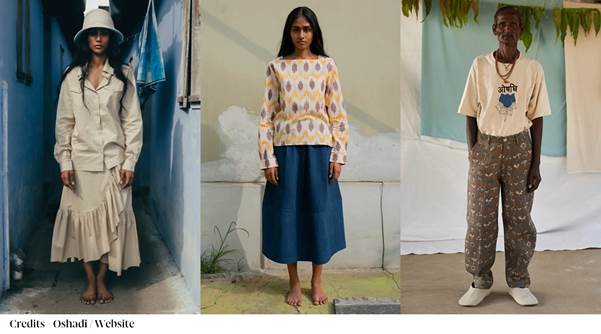
Oshadi, pronounced aw-sha-dhi, means “essence of nature” or “healing plant” in Sanskrit. Founded by Nishanth Chopra in 2016, Oshadi began as a womenswear label with a commitment to respecting and regenerating the Earth. The brand’s journey encompasses every aspect of clothing production, from printing and dyeing to weaving and spinning, ultimately focusing on sustainable practices.
At the heart of Oshadi is a 250-acre regenerative cotton farm that embodies ancient Indian agricultural techniques and artisan heritage. The brand collaborates with like-minded designers to create a positive environmental impact, growing cotton and indigo using restorative practices that enrich the soil and enhance biodiversity while capturing carbon.
Maati - By Neha Kabra
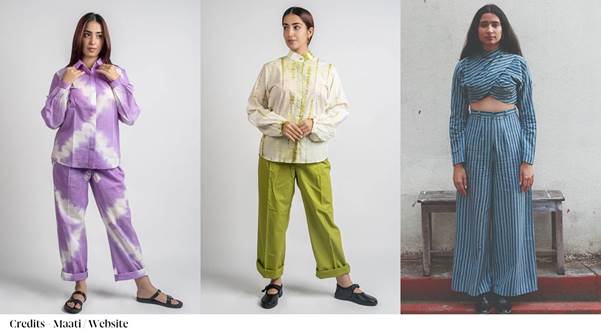
Maati is an ethical clothing label founded by Neha Kabra and based in Udaipur, focusing on organic and sustainable fashion that promotes slow fashion principles. The name ‘Maati’, which emphasises the cycle of nature, reflects the brand’s commitment to creating garments that honour the earth. Neha, a Fashion Design graduate, was inspired by her experiences in a joint family, prioritising needs over wants, and found her niche in nurturing creativity.
The designs at Maati cater to comfort-loving women, blending style with breathability and drawing inspiration from life experiences such as travel, heartbreak, and nature. The collections incorporate local flavours and art, adapting to various body types while ensuring that clothes are adjustable, skin-friendly, and ecologically responsible. Additionally, Maati follows a zero-waste policy, utilising upcycled yarns, natural dyes, and collaborating with local craftsmen from across India to create its garments.
11.11/ eleven eleven
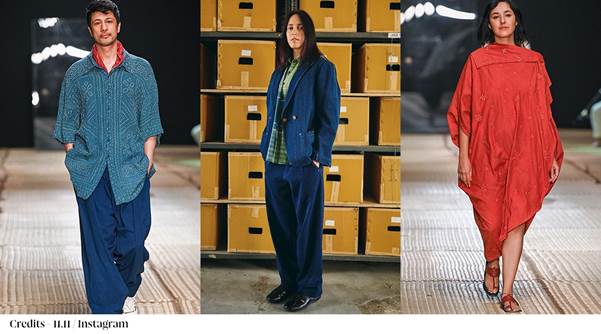
Founded by Mia Morikawa, a Graphic Design graduate from Central Saint Martin’s University of the Arts in London, and Shani Himanshu, who holds a Master’s in Fashion Design from Domus Academy in Milan, 11.11 / eleven eleven is a fashion label that emphasises craftsmanship, using indigenous cotton and 100 per cent natural dyes while employing heritage techniques such as hand spinning, handloom weaving, hand painting, miniature tie-dyeing, and quilting.
The brand focuses on small-batch, slow-made clothing, collaborating with artisan groups across India to create pieces that transcend geographic and gender boundaries. Each collection features relaxed silhouettes with a sartorial touch, reflecting the brand’s “seed to stitch” philosophy.
Nicobar
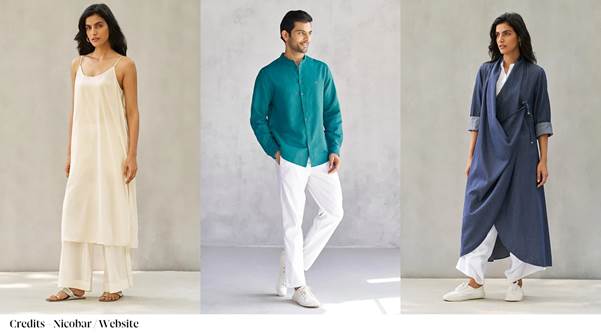
Founded by Simran Lal, Nicobar is a company that values culture as much as commerce, emphasising that journeys are often as meaningful as their destinations. The brand blends India’s rich heritage with contemporary design, bridging the gap between East and West while celebrating the complexity of modern identities. Each season, Nicobar embarks on a voyage to create a modern design aesthetic for India, drawing inspiration from the Indian Ocean and ancient trading routes. The design teams explore various locations, including Sri Lanka, Japan, Bali, Myanmar, China, Thailand, Zanzibar, and Madagascar, reflecting a sense of wanderlust in every creation while keeping Indian influences as a guiding principle.
IRO IRO
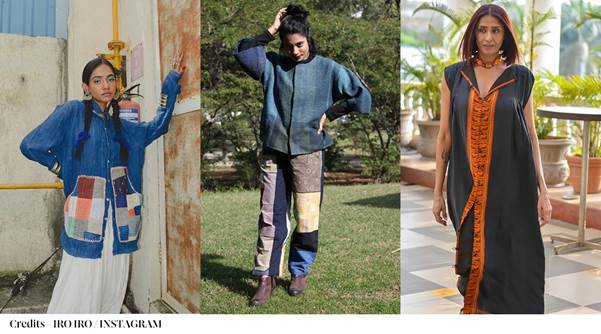
Founded by Bhaavya Goenka, IRO IRO is a circular design collective based in Jaipur that emphasises a practice driven by empathy towards all beings, the planet, and oneself. The collective defines Circular Design as a method that keeps materials in the value chain, focusing on working with waste, indigenous practices, and sustainable approaches. Through this ethos, IRO IRO aims to create a positive impact on both the environment and the community.
Ka-Sha
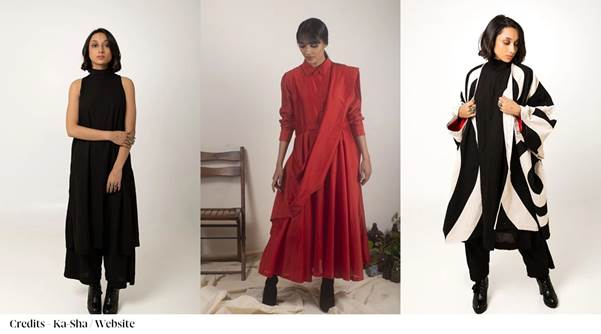
Founded in 2012 by Karishma Shahani Khan, Ka-Sha is a clothing label that uses garments as a means of expressing handcraft and celebrating life and its surroundings. The brand embraces both traditional and contemporary artisanal techniques, drawing inspiration from people, stories, journeys, and diverse perspectives.
Each piece is made from indigenous textiles and surface treatments, resulting in wearable clothing that resonates globally while being rooted in Indian culture. To address waste in a functional manner, Ka-Sha has developed Heart To Haat, a sister initiative focused on reusing, repurposing, and reclaiming materials. This initiative involves upcycling, recycling, mending, and repairing clothing and textiles using innovative craft techniques.
Upasana Auroville
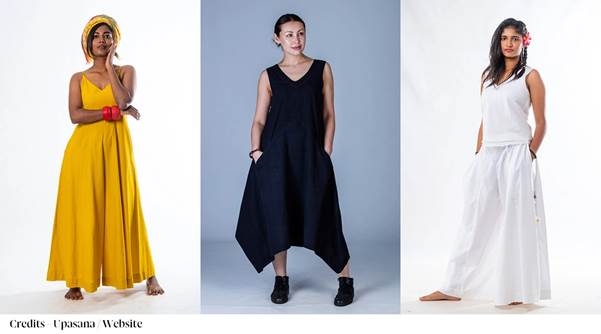
Founded in 1997, Upasana is a collaborative space for integral designers in Auroville, Tamil Nadu, dedicated to creating a sustainable future for fashion. This conscious clothing circle thrives under the expansive skies and lush forests, serving as an artist’s lab for evolution. At Upasana, creativity, fashion, design, Indian culture, business, social responsibility, and spiritual growth intertwine seamlessly. The collective believes in the interconnectedness of life and values the creation process as much as the final product, emphasising that true beauty transcends the physical form.
OZISS

Oziss, founded by Siddhant Yadav, is a brand dedicated to helping mindful individuals build an ethical wardrobe. The name ‘Oziss’, derived from the Sanskrit word ‘Ojas’, represents the positive energy from a healthy mind and body. With 37 years of experience in the clothing and textile industry, Siddhant’s commitment to ethical practices comes from his background as a factory worker. A National Institute of Fashion Technology graduate, he has received awards for his innovative sustainable textiles.
Recognising a gap for affordable, eco-friendly clothing, Siddhant spent two years researching and developing custom fabric blends and sustainable practices. Oziss aims to make sustainable fashion accessible to a wider audience, emphasising progress over perfection in its journey towards greater sustainability.
Ethicus
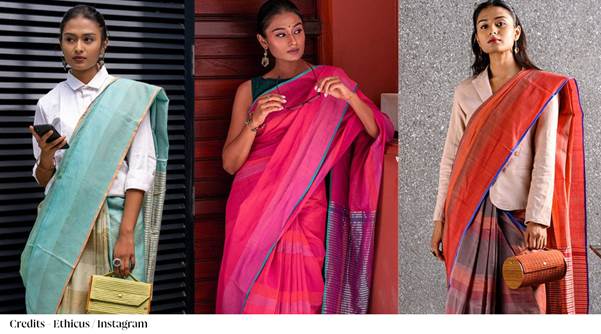
Ethicus is recognised as India’s first “Farm to Fashion” organic and sustainable fashion brand, co-founded by husband-and-wife duo Mani Chinnaswamy, a pioneer in cotton contract farming, and Vijayalakshmi Nachiar. They grow their own organic cotton, branded as ‘Eco-Logic Cotton’, ensuring the use of high-quality long and extra-long staple cotton in their products. The brand has established a handloom design studio in Pollachi, Tamil Nadu, collaborating with local weavers and traditional artisans to create world-class textiles for customers in India and abroad.
According to Vijayalakshmi Nachiar, the saree is the most sustainable clothing option, being a versatile, one-size garment that flatters women of all ages and body types. Ethicus offers a diverse collection of hand-woven organic cotton sarees, designed to be lightweight, beautifully textured, and suitable for various occasions, including work, festivities, and formal events.
Adheera
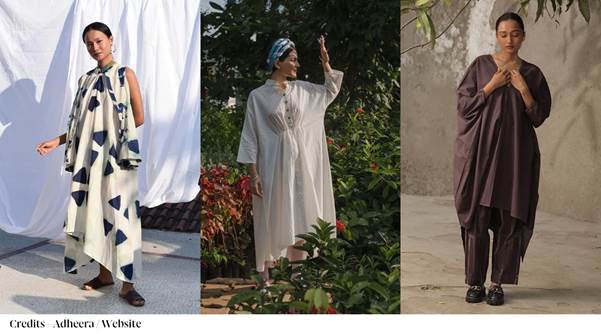
Adheera is a textile brand based in Ahmedabad, led by Dipika Udhani, a self-taught shibori artist and fashion entrepreneur. With over four years of experience in shibori techniques, the brand started as a casual exploration of tie-dye methods using leftover scraps. Adheera emphasises ethical fashion, focusing on sustainability by using organic fabrics, hand stitching, and natural dyes while minimising waste.
The handcrafted garments are designed to be timeless and seasonless, with each piece showcasing unique tie-dye patterns, surface ornamentation, and embroidery. The brand aims to create products that tell a story through their designs and colours, blending innovation with tradition.
Earthy Route
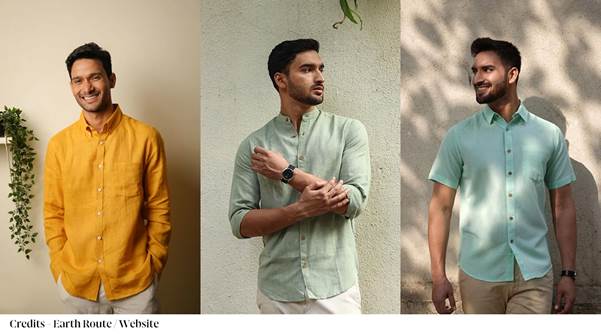
Earthy Route started as a blog to raise awareness about the dangers of fast fashion, which led founders Gauri and Varun to launch a sustainable clothing line focused on eco-friendly alternatives. Gauri, with her creative background and experience in the Big Four, and Varun, a finance enthusiast, both prioritise sustainability in their designs. Their fabrics, made from lyocell and linen, are breathable and comfortable, perfect for the Indian climate, while embracing the natural qualities of the materials. Earthy Route highlights the beauty of using sustainable textiles that benefit both the environment and personal well-being.
Lafaani
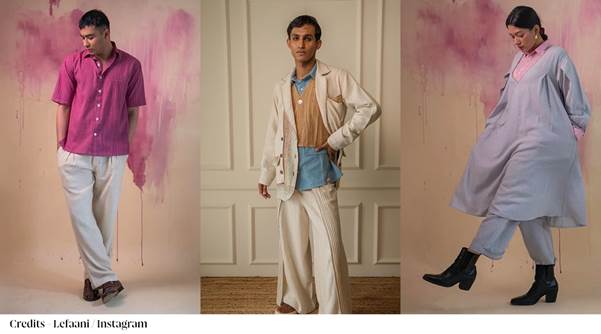
Lafaani, which means ‘immortality’ in Urdu, embodies the brand’s mission to create timeless merchandise that honours the craftsmanship of artisans. Founded by Drishti Modi and Rashmick Lafaani, the brand celebrates craft heritage by blending traditional techniques with modern aesthetics. Lafaani is committed to sustainability throughout its production, consumption, and post-consumption processes, emphasising the principles of slow clothing in its designs to enhance functionality and extend the lifespan of its products. The brand believes that fashion choices reflect personal values and aims to empower individuals by accentuating their beliefs through its creations.


 (1)20240730094415.jpg)

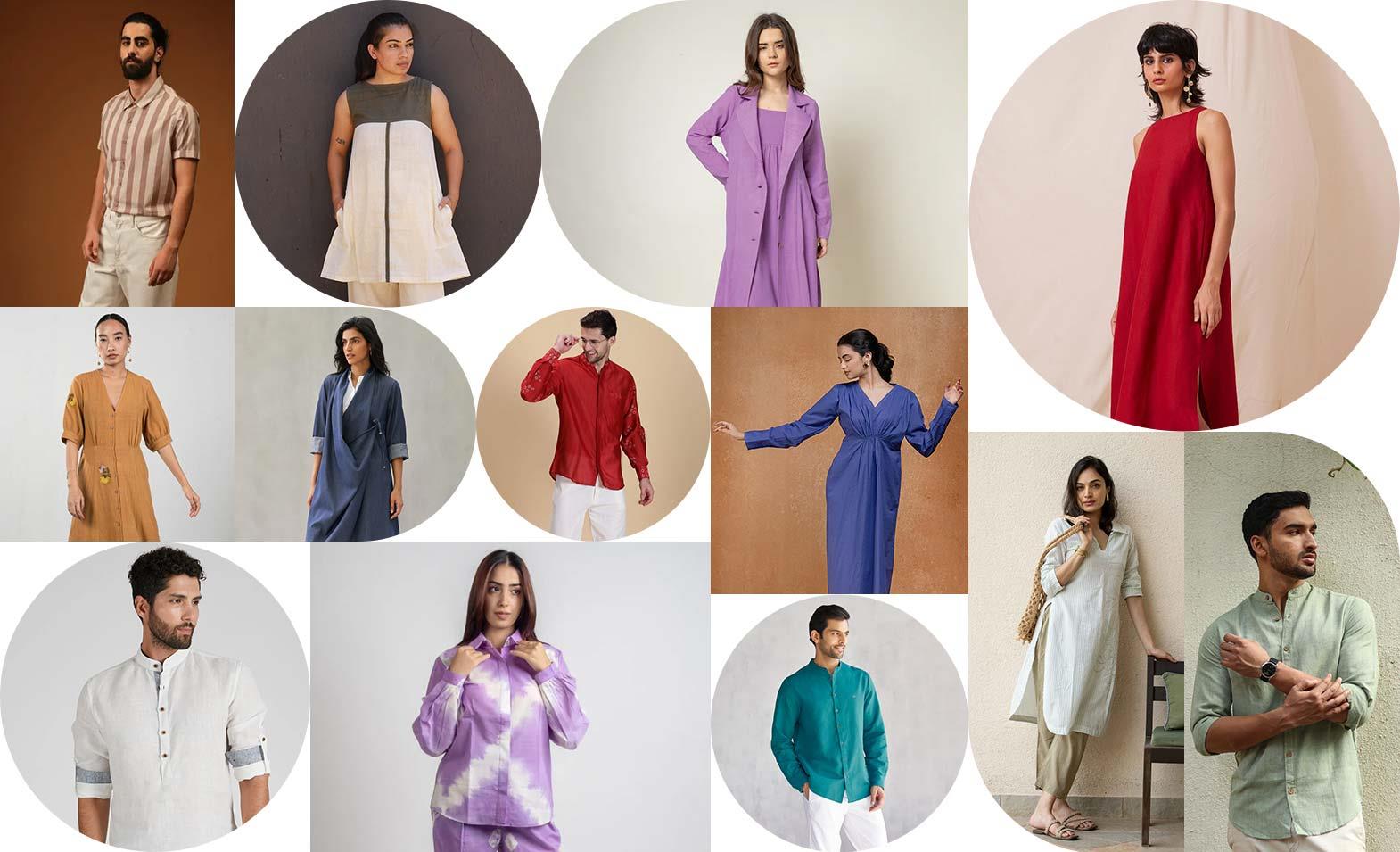

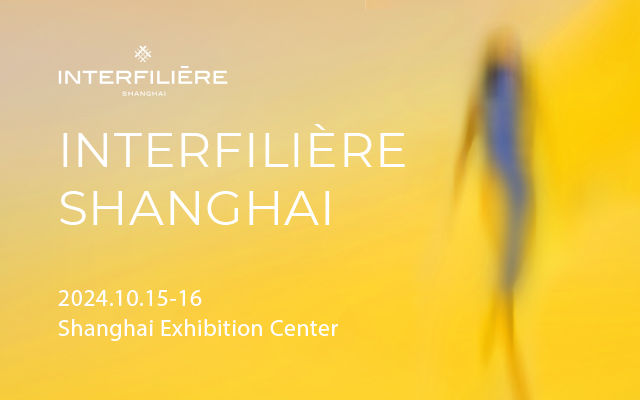



Comments